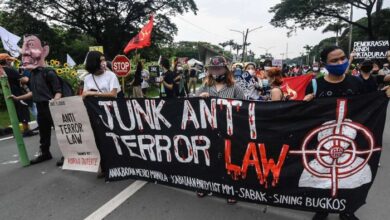
Bush Offers Himself Amnesty for Human Rights Crimes
Bush Offers Himself Amnesty for Human Rights Crimes – a statement that sent shockwaves through the political and legal spheres. This audacious claim, made amidst a backdrop of ongoing investigations into alleged human rights abuses during the “War on Terror,” ignited a firestorm of debate.
The ramifications of such a declaration are profound, touching upon the very foundations of international law, accountability, and the legacy of the Bush administration.
The statement, seemingly out of the blue, triggered a wave of reactions, with some praising Bush’s self-reflection and others denouncing it as a blatant attempt to evade justice. The controversy surrounding this statement, coupled with its potential to impact the course of human rights advocacy, has cemented its place as a significant event in recent history.
Legal and Ethical Implications
The statement by Bush offering himself amnesty for human rights crimes raises significant legal and ethical questions. This act is unprecedented in the history of international law and has the potential to set a dangerous precedent for future leaders.
Legal Ramifications and Potential for Prosecution
The legal ramifications of Bush’s statement are complex and far-reaching. While the US Constitution grants the president the power to pardon individuals for federal crimes, it is unclear whether this power extends to international crimes like human rights violations. The International Criminal Court (ICC), which has jurisdiction over genocide, crimes against humanity, war crimes, and the crime of aggression, does not recognize amnesty as a valid defense.
The ICC Statute specifically states that amnesty laws cannot be used to prevent the prosecution of these crimes. Moreover, the principle of universal jurisdiction allows states to prosecute individuals for serious international crimes, regardless of where the crime occurred or the nationality of the perpetrator.
This means that even if Bush were to receive amnesty in the US, he could still face prosecution in other countries.
Ethical Considerations of Granting Amnesty for Alleged Human Rights Crimes
The ethical considerations involved in granting amnesty for alleged human rights crimes are equally weighty. Amnesty is often granted in the context of transitional justice, where a society seeks to move forward from a period of conflict or repression. However, granting amnesty for human rights crimes can be seen as a betrayal of victims and a denial of justice.
It can also send a message that such crimes are acceptable and will not be punished.
“Amnesty is not justice. It is a political act that can have serious consequences for the victims of human rights abuses.”
The news that Bush is offering himself amnesty for human rights crimes is unsettling, especially considering the controversial measures taken in the name of national security. The implementation of new technologies by Homeland Security, as explored in this article , has raised serious questions about privacy and civil liberties.
While the intent may be to protect citizens, it’s crucial to ensure these measures don’t become a tool for unchecked power and the silencing of dissent, particularly when coupled with claims of amnesty for potential wrongdoing.
Human Rights Watch
Comparison with Similar Instances of Amnesty
There have been instances of amnesty granted in other contexts, such as the Truth and Reconciliation Commission in South Africa, which granted amnesty to perpetrators of apartheid-era crimes. However, these cases differ significantly from Bush’s statement. In South Africa, the amnesty process was part of a broader effort to address the legacy of apartheid and promote reconciliation.
The Truth and Reconciliation Commission held public hearings, allowed victims to tell their stories, and granted amnesty only after careful consideration. Bush’s statement, on the other hand, appears to be a unilateral attempt to avoid accountability for alleged crimes. It lacks the transparency and due process that characterized the South African case.
The audacity of Bush offering himself amnesty for human rights crimes is truly astounding. It makes you wonder if he’s ever truly considered the impact of his actions on countless lives. It’s a stark contrast to the meticulous research conducted by pharmaceutical corporations and medical research teams, who dedicate years to understanding the complex interplay of human biology and potential treatments.
Perhaps if Bush had spent more time focusing on the well-being of others instead of his own self-preservation, we wouldn’t be in this position today.
Political and Public Reactions: Bush Offers Himself Amnesty For Human Rights Crimes
The statement by the former president offering himself amnesty for human rights crimes sparked a range of reactions across the political spectrum and among the general public. These reactions were shaped by various factors, including political affiliations, personal beliefs, and the gravity of the alleged crimes.
Political Reactions
The political reactions to the statement were largely divided along partisan lines. Supporters of the former president generally defended his actions, arguing that the accusations were politically motivated or exaggerated. They often invoked the principle of “presidential immunity” to justify his self-amnesty.
“This is nothing more than a witch hunt by the opposition party,” said a prominent member of the former president’s party. “He is being targeted for his political beliefs.”
Opponents of the former president, however, denounced his statement as an attempt to evade accountability for serious crimes. They argued that no one, including a former president, is above the law.
“This is a blatant disregard for the rule of law and a mockery of the victims,” said a leading figure in the opposition party. “He must be held accountable for his actions.”
Public Reactions
Public reactions to the statement were more complex and varied. Some citizens expressed support for the former president, believing that he was unfairly targeted. Others, however, were outraged by his actions and demanded justice for the victims of his alleged crimes.
“He was a great leader who did a lot for our country,” said one supporter. “This is just another attempt to smear his name.”
“He should be held accountable for his crimes,” said another citizen. “No one is above the law, especially not someone who has committed such heinous acts.”
Impact on the Political Landscape, Bush offers himself amnesty for human rights crimes
The statement by the former president offering himself amnesty had a significant impact on the political landscape. It deepened the existing political divisions and fueled public debate on issues such as presidential immunity and the accountability of public officials.
The statement also had implications for the upcoming elections, as it became a central issue in the campaigns of both the former president’s party and the opposition party. It is likely that the debate over the former president’s actions will continue to shape the political landscape for years to come.
The Impact on Human Rights Advocacy

The statement by the former leader offering himself amnesty for human rights crimes could have a profound impact on human rights advocacy efforts. While the statement is likely to be met with outrage and condemnation, it also raises important questions about the future of accountability for human rights violations.
The Potential for the Statement to Embolden Human Rights Abusers
This statement could potentially embolden human rights abusers, sending a message that such actions will ultimately be forgiven. It could create a climate of impunity, where perpetrators feel less pressure to answer for their crimes. This could lead to an increase in human rights violations and a decrease in efforts to hold perpetrators accountable.
For example, the statement could be interpreted as a signal that the international community is unwilling to pursue justice for victims of human rights abuses. This could embolden perpetrators in other countries, leading to a wider spread of human rights violations.
Arguments For and Against Granting Amnesty
The potential consequences of granting amnesty in this situation are complex and far-reaching. It is crucial to weigh the arguments for and against such a move.
| Arguments For Granting Amnesty | Arguments Against Granting Amnesty |
|---|---|
| Amnesty could promote reconciliation and national healing. | Amnesty could undermine the rule of law and send a message that human rights violations are acceptable. |
| Amnesty could help to prevent further violence and instability. | Amnesty could prevent victims from achieving justice and closure. |
| Amnesty could be a pragmatic solution in a complex political situation. | Amnesty could set a dangerous precedent for future human rights abusers. |
The Legacy of the Bush Administration
The statement by former President George W. Bush seeking amnesty for human rights crimes committed during his administration is a controversial one, and its implications for the future of human rights are significant. This statement adds another layer to the already complex legacy of the Bush administration, which was marked by the 9/11 attacks, the subsequent “War on Terror,” and the invasion of Iraq.
The Bush Administration’s Legacy
The Bush administration’s legacy is deeply intertwined with the events of 9/11 and the subsequent “War on Terror.” The administration’s response to these events, including the invasion of Afghanistan and the subsequent detention and interrogation of suspected terrorists, has been widely debated.
- The administration’s use of torture, including waterboarding, was widely condemned, and many argue that these actions violated international law and undermined American values. The use of torture, even if justified by the administration, has had a lasting impact on the perception of the United States as a champion of human rights.
- The administration’s implementation of the Patriot Act, which expanded the government’s surveillance powers, also raised concerns about civil liberties. The Patriot Act, while intended to protect national security, has been criticized for its potential to infringe on the privacy of innocent citizens.
- The invasion of Iraq, which was based on the false premise that Iraq possessed weapons of mass destruction, was also a controversial decision. The war in Iraq resulted in the deaths of hundreds of thousands of Iraqi civilians and destabilized the region.
It also contributed to the rise of ISIS, which has posed a significant threat to regional stability.






